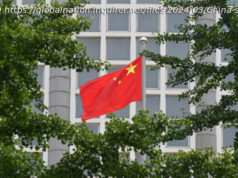Beijing’s ideological agenda has gone global.
For decades, conventional wisdom in the United States held that it was only a matter of time before China would become more liberal, first economically and then politically. We could not have been more wrong—a miscalculation that stands as the greatest failure of U.S. foreign policy since the 1930s. How did we make such a mistake? Primarily by ignoring the ideology of the Chinese Communist Party. Instead of listening to the CCP’s leaders and reading its key documents, we believed what we wanted to believe: that the Chinese ruling party is communist in name only. Today, it would be a similarly grave mistake to assume that this ideology matters only within China. In fact, the CCP’s ideological agenda extends far beyond the country’s borders and represents a threat to the idea of democracy itself, including in the United States. Chinese President Xi Jinping’s ambitions for control are not limited to the people of China. Across the globe, the CCP aims to spread propaganda, restrict speech, and exploit personal data to malign ends. The United States, accordingly, cannot simply ignore the CCP’s ideological objectives. Washington must understand that the fight against Chinese aggression first requires recognizing it and defending ourselves against it here at home, before it is too late. The CCP is a self-proclaimed Marxist-Leninist organization, and Xi, as the party’s top general, sees himself as Stalin’s successor. Marxism-Leninism is a totalitarian worldview that maintains that all important aspects of life should be controlled by the state, and the CCP’s intent to dominate political thought is stated openly and pursued aggressively. For many years, the CCP’s leaders have emphasized the importance of “ideological security.” A 2013 Chinese policy on the “current state of ideology” held that there should be “absolutely no opportunity or outlets for incorrect thinking or viewpoints to spread.” “Chinese leaders have always believed that power derives from controlling both the physical battlefield and the cultural domain,” the journalist and former Australian government official John Garnaut has noted. “Words are not vehicles of reason and persuasion. They are bullets. Words are for defining, isolating, and destroying opponents.” Within China, this approach means mandatory study sessions on communist ideology and the required use of smartphone apps teaching “Xi Jinping Thought.” It means heavy censorship of all media. Outside sources of information are banned—from foreign newspapers to Twitter, Facebook, and WhatsApp. The CCP reinterprets religious texts, including the Bible, to support its ideology and locks up millions of Muslim Uighurs and other minorities in reeducation camps, where they are subjected to political indoctrination and forced labor. Efforts to extend this control of information and expression globally are well underway. Nearly every Chinese-language news outlet in the United States is owned by the CCP or follows its editorial line. Americans hear pro-Beijing propaganda on more than a dozen FM radio stations. Chinese-owned TikTok deletes accounts criticizing CCP policies. Since August 2019, Twitter has removed more than 170,000 CCP-linked accounts for spreading “manipulative and coordinated” propaganda. It is no coincidence that China has expelled so many Western reporters in recent months—Beijing wants the world to get its news about China, and especially about the origins of the novel coronavirus, from its own propaganda organs. In addition to influencing the information Americans receive regarding China, the CCP is increasingly using its leverage to control American speech. When the general manager of the Houston Rockets basketball team tweeted his support for peaceful protesters in Hong Kong, the CCP announced that Rockets games would not be shown on Chinese TV and pressed others associated with the league, including star players, to criticize the tweet. Under pressure from the CCP, American, Delta, and United Airlines removed references to Taiwan from their websites and in-flight magazines. Mercedes Benz apologized for posting an inspirational quote from the Dalai Lama. MGM digitally changed the nationality of an invading military from Chinese to North Korean in a remake of the movie Red Dawn.






